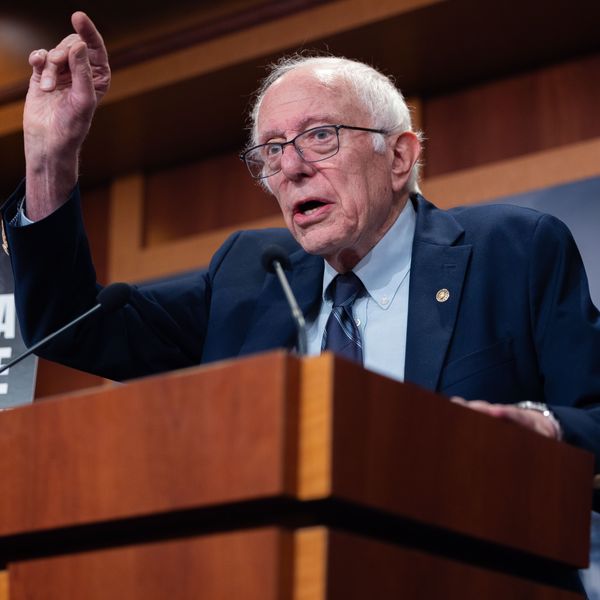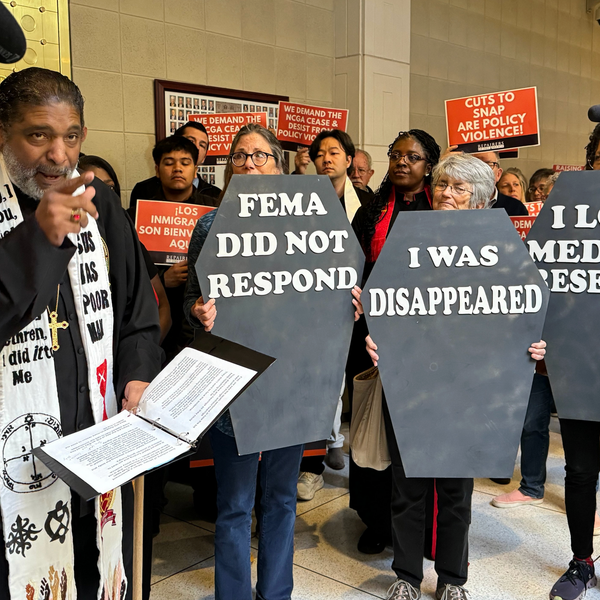President Obama and congressional Republicans arrived at the White House health care summit with talking points
-- not just for the summit itself but for the after-summit jockeying to
claim the upper hand coming out of a session that always had more to do
with messaging than making progress to insure more Americans at less
cost.
Obama got off a good enough line about "not campaigning anymore."
Congressman Eric Cantor, the Virginia Republican who has become a "party of no" pointman, showed up with Ross Perot-style props and plenty of gripes.
Ultimately, Obama summed things up pretty well:
I think we're establishing that there are actually some
areas of real agreement," he said, stopping for a minute outside the
gates. "And we're starting to focus on what the real disagreements are.
If you look at the issue of how much government should be involved,
the argument that the Republicans are making really isn't that this is
a government takeover of health care but rather that we're ensuring the
-- we're regulating the insurance market too much. And that's a
legitimate philosophical disagreement.
The problem, of course, is that most of the really meaningful disagreements went undiscussed.
The summit positioned Obama and a relatively united Democratic
leadership against Senate Minority Leader Mitch McConnell, R-Kentucky,
House Minority Leader John Boehner, R-Ohio, and their "party of no"
minions.
They got in the same room, and stuck around for a long time.
But they did not get along.
They did not offer much in the way of new ideas, let alone ideas
that might actually meet the challenge of providing care for all
Americans without breaking the bank.
What would have made the gathering at Blair House more interesting
and, potentially, more useful would have been an airing -- in this
C-Span aired, high profile setting -- of the range of ideas that
members of Congress entertain with regard to health-care reform.
Unless Thursday's summit was a conference committee meeting, a final
session for reconciling differing House and Senate measures (perhaps
with some prodding from an engaged president), the product of the
session was never going to be a final health-care reform bill.
So why not talk about best responses to a very real crisis?
Why not consider not just Republican alternatives to President
Obama's proposal but the fix that Obama, himself, once suggested (as a
2004 U.S. Senate candidate) was the essential point of beginning for a
just and equitable health-care system in a developed nation? Why not
let the dozens of House and Senate members who support a
Medicare-for-All, single-payer system into the discussion? Why not let
House Judiciary Committee chair John Conyers, D-Michigan, Senator
Bernie Sanders, I-Vermont, and other members of Congress ask the
questions that should be asked about Obama's compromise plan?
Instead of Republican grumbling about how Obama is going to far, why
not have a rational discussion about whether Obama is going far enough?
That rational discussion could have begun with a review of the response the presidential proposal by Physicians for a National Health Program, the organization of 17,000 doctors who support single-payer, Medicare-for-All approach to reform.
PNHP leaders, including the organization's national coordinator, Dr.
Quentin Young asked to be included in the Blair House session. (And
this White House knows Young. The Chicago physician whose office once
cared for Obama and his family and whose friendship with the future
president was forged more than a decade ago.)
So, too, did congressional backers of Medicare-for-All proposals,
including Dennis Kucinich, D-Ohio; Anthony Weiner, D- New York, and
Peter Welch, D-Vermont, all made similar requests.
What might have been added to the discourse.
Consider Dr. Quentin Young's Young's assessment of the president's plan.
"Regrettably, the president's proposal is built on some of the worst
aspects of the Senate bill," Young said, in an accurate assessment of
Obama's approach. "For example, the president's proposal would ship
hundreds of billions of taxpayer dollars to the private health
insurance industry in the form of subsidies. And to help finance this,
it would impose a new tax on health benefits of workers, especially
those in high-cost states.
Added Young:
(Obama's proposal for an) individual mandate would
force millions of middle-income uninsured Americans to buy insurers'
skimpy products - insurance policies full of gaps like ever-rising
co-pays, deductibles and premiums. Such policies already leave
middle-class American families vulnerable to economic hardship and
medical bankruptcy in the event of a serious illness like cancer,"
continued Young, citing a recent study.
Even so, at least 23 million people would remain uninsured," he
said. "We know that being uninsured raises your chance of dying by
about 40 percent," he continued, citing another recent study. "That
translates into about 23,000 unnecessary deaths each year. As
physicians, we find this completely unacceptable.
"In short," added Young, "this proposal is an insurance company
bonanza, not good, evidence-based health reform. The president would do
better by abandoning the insurance and drug companies and instead
taking up the single-payer approach."
Young and his allies are not another "party of 'no'" -- they
actually propose a viable alternative that could save hundreds of
billions of dollars annually by simplifying health administration.
"By building on and improving the already popular Medicare program,
we could put our patients' interests first," says Dr. Young. "Were
President Obama to do so, he would meet with strong public support,
including from the medical community."
Dr. Young is right, and there are plenty of members of the House and Senate who agree with him.
Unfortunately, Medicare-for-All advocates weren't invited to the table.
The resulting health-care summit suffered for their absence -- as
does the broader debate about how to do health-care reform right.


